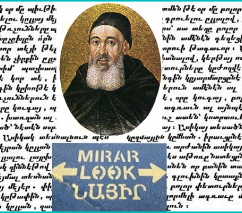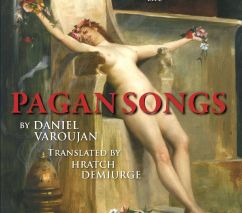Critique | On Jennifer Manoukian’s “That’s not Armenian! Encounters with language purists past and present”
August 10, 2022
Last week, we published Jennifer Manoukian's essay entitled “That’s not Armenian! Encounters with language purists past and present,” and asked for comments on the topic.
Hratch Demiurge, a long-time contributor to h-pem, came up with a respectful critique—which appeared first in his satirical online journal Bread and Onions, discussing why purism sometimes matters with regard to the spoken language.
Check out Demiurge's insightful perspective peppered with his signature wit and humor, and let us know what you think in the comments below!*
| Writer's name | Hratch Demiurge |
| Occupation | Comedian; poet; teacher; translator |
| City/Country | Los Angeles, Calif. |
| About the writer |
|
Follow:
Araksya Karapetyan has nothing to do with this article. I refer to the Armenian etymology of "fox" down below to make a point, and thinking that a cartoon fox or a fox native to Armenia might make for an appropriate and eye-catching header image, I Googled "Armenian fox" to see what would come up. The first picture that popped up was this picture of Araksya Karapetyan. That's pretty funny, so I decided to go with it. It's very confusing, but it is eye-catching, so everything worked out for the best.
Jennifer Manoukian’s recent essay titled “That’s not Armenian! Encounters with language purists past and present” published on H-Pem is thoughtful and informative and worth reading. It argues that the Armenian language has always borrowed from others and even the version of Armenian which we commonly think is the most “pure Armenian” (մաքուր հայերէն), classical Armenian, is also full of borrowings from other languages, especially Persian. It advocates an easing up of the purist approach to the language adopted by the Mekhitarists in the 1700’s and a more relaxed attitude toward spoken Western, and presumably Eastern Armenian as well. An Armenian in America, for example, shouldn’t be judged for peppering their spoken Armenian with English words because that will turn them away from using the language altogether.
Instead of boring the reader with a long and detailed breakdown of the entire essay, I only wish to point out what I see as the flaw in the argument, which I believe is contained in the following passage:
Unlike today where language is imbued with tremendous symbolic value and seen as a pillar of identity, Armenian identity before the 1800s was more inextricably linked to religious belonging. Simply a tool for communication, the language you spoke—whether it was a variety of Armenian or Turkish, Kurdish, Arabic or even Russian or Hungarian—was considered to be of little consequence to your Armenianness as long as you were part of the Armenian Church. Little attention, in other words, was paid to the spoken word.
This is undeniably true. But because it is true, there is a contradiction in the argument and the conclusion does not follow. Because the Armenian Church was so central to being Armenian while language was secondary, now that the Armenian Church is secondary and not of central importance, language of necessity takes its place as being of central importance. Indeed, there is nothing else that could take this central place other than language, since Armenians have no laws and no philosophy. With no religious obligation, no spoken linguistic standard, no written linguistic standard (I mean the split between Mesropian and Abeghian orthography), no philosophy, and no laws, what is left of the Armenian identity except the same confusion and ambiguity that has existed from generation to generation? She makes the case only for the spoken and not the written language, but, let’s be honest, considering Armenians don’t read and Armenian literature is in a virtual Dark Age, the spoken language is the only way the vast majority use it at all.
If the circumstances were different, I would wholeheartedly agree with her. While language is important, it’s not the most important aspect of culture. How could it be if anyone could do it after six months of Rosetta Stone? If tomorrow all Armenians collectively started speaking Japanese, they would remain Armenian. But given the cultural void, even an ephemeral thing like language becomes all-important, and purism regarding it should be expected to kick into high gear. As she notes, “purism is a common reaction to anxiety or insecurity about the future of a language”, and, in the case of Armenians today, it’s not only anxiety about the future of a language, but the future of the nation itself.
No doubt she would argue, as she does in the article, that purism is ultimately quixotic since there is no pure Armenian language, or any language for that matter. A brief note on that. Relying on the authority of the renowned linguist Hratchia Adjarian, she attempts to demonstrate the indebtedness even of classical Armenian to foreign languages by listing a number of words which seem to be derived from Greek. One example is the word for squirrel, in Armenian skyur (սկիւռ), which Adjarian derives from the Greek skíouros (σκίουρος). But similarity between classical Greek and classical Armenian words doesn’t necessarily prove it was borrowed since, after all, it may well be an underlying Indo-European sharing. For example, from my own studies, I know that the Armenian word for fox is ałuēs (աղուէս) and in Greek alopex ( ἀλώπηξ ), nearly identical words. Unless it can positively be shown to have been borrowed from Greek, it is safer to assume that it is an underlying commonality of two dialects of the same root language, especially for simple non-technical words that have nothing to do with philosophy or science. Indeed, after looking into it, the Greek word skíouros (σκίουρος) is traditionally explained as a combination of σκιά, “shade” and οὐρά, “tail” on the grounds that squirrels hold their tails over their heads and shade themselves. That sounded like a real stretch to me, and researching it a little further, it seems nowadays this is rightly suspected as a folk etymology and might very well be Pre-Greek. The Greeks themselves were puzzled by the meaning of many of the words they used, and in one instance, Plato, in Cratylus 410a, connects a number of Greek words with no apparent explanation to the Phrygian language of Asia Minor.
Socrates: Well, this word πῦρ (fire) is probably foreign; for it is difficult to connect it with the Greek language, and besides, the Phrygians have the same word, only slightly altered. The same is the case with ὕδωρ (water), κύων (dog), and many other words.
Hermogenes: Yes, that is true.
Socrates: So we must not propose forced explanations of these words, though something might be said about them. I therefore set aside πῦρ and ὕδωρ in this way.
Herodotus in Book 2, Chapter 2 of his Histories recorded that the Egyptians believed that Phrygian was the oldest language on earth. And for what it’s worth, in Book 7, Chapter 73, Herodotus connects the neighboring Phrygians and Armenians as having a cultural connection, though genetics and archaeology has not supported his belief that Armenians were Phrygian colonists.
In conclusion, purism in language has its time and place, and considering the time and place Armenia is in, that time and place is now more than ever. Even with regard to the spoken language, there have to be general rules and standards as much as Armenians generally hate standards and rules. If it is objected that purism is a mirage with no reality to it, I admit it has its limits, but that doesn’t mean a man dying of thirst in the desert should stop looking for clean water. Obviously, if one is dying, by all means, they should slurp up whatever sludge bubbles up from between a camel’s dung-encrusted toes. But the best is to make an effort and keep searching and, who knows, he may come across a real oasis flowing with մաքուր ὕδωρ.
Post Script
My hunch about the cause of the similarity between the Greek and Armenian word for “fox”, which made me doubt the Greek origin of skyur (սկիւռ), seems to have been correct. The Greek alopex ( ἀλώπηξ ) and its many variations in Indo-European languages is classed as a Mediterranean wanderword, that is, a word that has spread far and wide among so many different people around the Mediterranean that its origin is anyone’s guess. I consulted Adjarian here and, for his part, in this case, he thinks ałuēs (աղուէս) is a “բնիկ հայ բառ.”
* The article is republished from Bread and Onions with the generous permission of the author.
Are you an aspiring writer, poet, or artist? Show the world what you've got!
Join our community and receive regular updates!
Join now!




Attention!